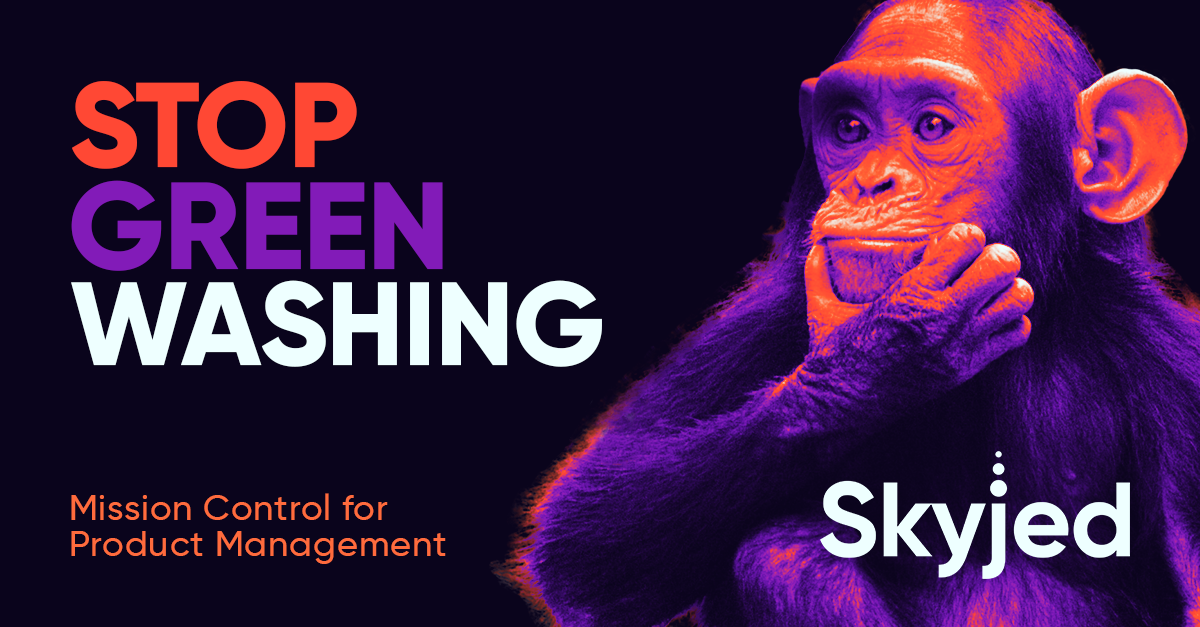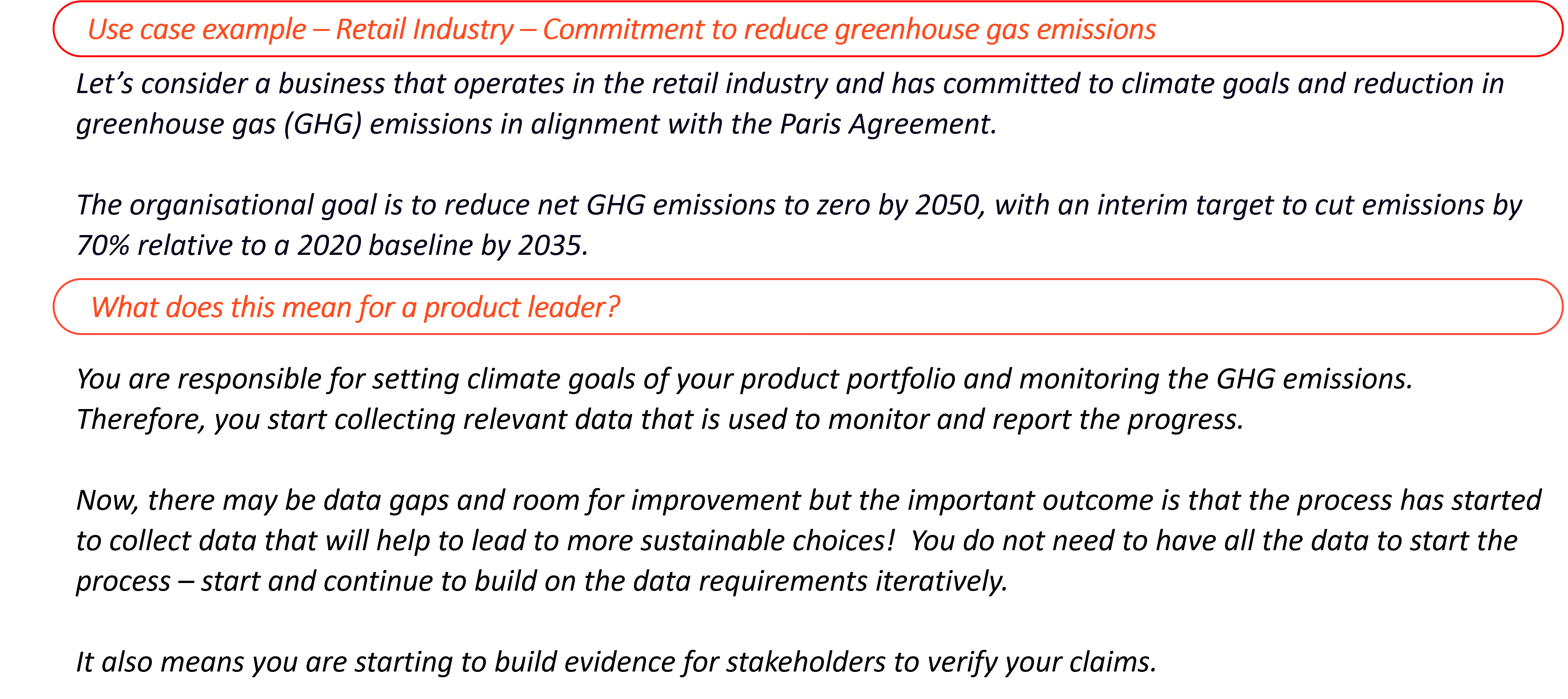How product leaders can stop greenwashing
by Dr. Lisa Marini

We all have at various extents, been sceptical about product claims like ‘environmentally friendly’, ‘green’, or ‘sustainable’ and perhaps we are still understanding what they exactly mean. While we are learning what transitioning into a more sustainable economy entails, as consumers and investors what we do not want is to be misled and make decisions based on vague or unclear environmental claims.
As Product Leaders, what we want is to be able to offer products that are genuinely sustainable and environmentally friendly and still can successfully compete in the market. We also want to put customers in a position to clearly distinguish between a product that is genuinely sustainable and one which is not.
Greenwashing is the practice of making exaggerated, misleading, or unsubstantiated sustainability-related claims about a product/service. This can happen either intentionally or unintentionally. In the instance of financial products, it is the practice of misrepresenting the extent to which the product or investment strategy is environmentally friendly, sustainable, or ethical (ASIC, 2022). In addition, there is greenwashing when a company attempts to highlight sustainable aspects of a product to overshadow its involvement in environmentally and socially damaging practices.
The implications of such practice within organisations and markets are multiple, for example: reduced consumer and investor confidence in ESG-related or sustainable products; reputational risk; increased scrutiny by regulators, consumers, and environmental groups and other.
National regulators have increasingly recognised the issue and are acting accordingly.
In Australia, as part of the 2022-23 Compliance and Enforcement Priorities, the Australian Competition and Consumer Commission (ACCC) is prioritising consumer and fair-trading issues in relation to environmental and sustainability claims. In October-November 2022, the ACCC conducted an internet sweep to identify misleading environmental and sustainability marketing claims. What was found is that 57% of the 247 business reviewed were classified as making concerning claims about their environmental credentials. The most worrisome data was in the cosmetic, clothing and footwear and food and drink sectors. This finding is a call to action for preventing the issue and together creating fair markets.
The Australian Securities and Investments Commission (ASIC) has also released in February 2023 its latest enforcement and regulatory report including its enforcement priorities for 2023. One priority is targeting greenwashing, predatory lending and misleading insurance pricing promises. Effort in this area is evidenced by the fact that for the first time, ASIC has taken a company (Mercer Superannuation) to court for allegedly misleading customers with claims of environmentally sustainable investments when actual investments were in coal and other fossil fuels, along with alcohol and gambling stocks. (See also: ASIC’s 2023 enforcement priorities and latest report insights (skyjed.com)).
Within the current Australian regulatory context, Skyjed’s top three recommendations for Product leaders who want to build sustainable products and stop greenwashing are:
1. Back up sustainability claims with data and evidence that demonstrate how you are transitioning the product/service into a more sustainable one.
Our recommendation is to start generating ESG data and reports as per the most popular guidelines and standards on sustainability reporting. This will help with making assessments and setting environmental and social goals that align not only with the company sustainability strategy but also to national and global trends.
Why does it matter?
Because scrutiny and reporting around ESG disclosures is increasing. By building evidence and documenting decisions, you create the foundation for supporting the product sustainability claims with reasonable grounds that can be verified. This is also true for representations made about reaching targets and/or future scenarios. For example, ASIC explains that “if you stated that you will achieve a certain carbon emissions target (such as net zero carbon emissions) by a particular date […] Such a representation may be deemed to be misleading if you do not have reasonable grounds for making the representation (see section 769C of the Corporations Act and section 12BB of the ASIC Act).” Ultimately, the quality of management decisions is higher when informed by the right data and evidence.

2. Start making sustainability-related decisions across the whole Product Lifecycle.
Our recommendation is to embed sustainability across the whole Product Lifecycle Management stages and make it a consistent practice across the portfolio.

Why does it matter?
Because customers and investors are increasingly interested in knowing how product they purchase may impact the environment and society. Gone are the times when the supply and value chains of a product or service can stay silent or not consider sustainability and environment impacts.
Sustainability is becoming a factor that influences the decision-making process of the customer and product leaders need to be mindful of that. In addition, regulators are pushing towards a more sustainable economy and, in order to be successful and stay in the market, products and services need to be designed and distributed with sustainability in mind.

3. Leverage AI and digital solutions to automate ESG reports and implement regular monitoring and improvement of the ESG performance.
Our recommendation for Product leaders and team is to be equipped with the right tools so that the process of oversight and monitoring of ESG information becomes easier.
Why does it matter?
ESG reporting is a rapidly growing and changing space, it is easy to feel overwhelmed and lose sense of direction. AI plays a critical role in supporting functions such as, automated reporting, data analysis and compliance monitoring. This can improve data visibility and traceability by providing stakeholders with the information they need to make informed decisions and hold organisations accountable for their actions.

About Skyjed
Skyjed is an end-to-end product governance platform. The platform provides an automated system for a product-centric oversight and monitoring that encompasses a range of domains: Revenue, Value, Customer Experience, Innovation and Regulatory. Sustainability sits across the five domains. As a result, the user has a complete 360-degree view of a product’s health and performance.
Thanks to Skyjed businesses are equipped with an automated product governance system that can be leveraged to improve the sustainability performance of products, services and portfolios.



